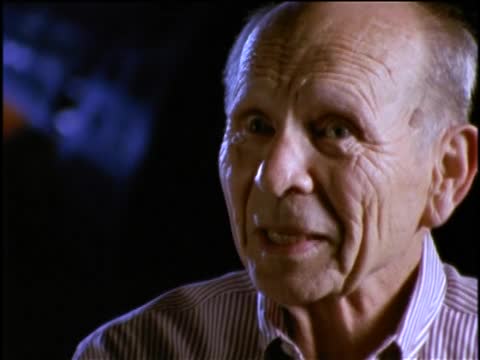NOVA; To the Moon; Interview with Maxime "Max" Faget, a mechanical engineer who worked on Mercury, Gemini, and Apollo spacecraft, part 1 of 3, unedited

- Series
- NOVA
- Episode
- To the Moon
- Producing Organization
- WGBH Educational Foundation
- Contributing Organization
- WGBH (Boston, Massachusetts)
- AAPB ID
- cpb-aacip/15-3775t3h31h
If you have more information about this item than what is given here, or if you have concerns about this record, we want to know! Contact us, indicating the AAPB ID (cpb-aacip/15-3775t3h31h).
- Description
- Program Description
- This remarkably crafted program covers the full range of participants in the Apollo project, from the scientists and engineers who promoted bold ideas about the nature of the Moon and how to get there, to the young geologists who chose the landing sites and helped train the crews, to the astronauts who actually went - not once or twice, but six times, each to a more demanding and interesting location on the Moon's surface. "To The Moon" includes unprecedented footage, rare interviews, and presents a magnificent overview of the history of man and the Moon. To the Moon aired as NOVA episode 2610 in 1999.
- Raw Footage Description
- Maxime "Max" Faget, a mechanical engineer who worked on Mercury, Gemini, and Apollo spacecraft, is interviewed about various NASA spacecraft. Faget explains the issues with the heat shield during John Glenn's Mercury flight, and talks about the best way to go to the moon, explaining direct descent versus Earth Orbit Rendezvous versus Lunar Orbit Rendezvous. Faget explains his first thoughts of LOR, and talks about the difficulties of EOR, and the possibility of using a NOVA rocket to get to the moon. The final seven minutes of the interview is audio-only of Glynn Lunney talking about Russia's role in the Apollo program, with Lunney saying that the US Manned Space Program began in response to Sputnik, and talking about the sense of competition between the US and Russia, Gemini's creation of confidence in space, and the amazement of the Mission Control crew during Apollo 12 and 13. The final minute of the interview is audio only of Faget talking about John Glenn's Mercury flight.
- Created Date
- 1998-00-00
- Asset type
- Raw Footage
- Genres
- Interview
- Topics
- History
- Technology
- Science
- Subjects
- American History; Gemini; apollo; moon; Space; astronaut
- Media type
- Moving Image
- Duration
- 00:19:35
- Credits
-
-
Interviewee: Faget, Maxime, 1921-2004
Producing Organization: WGBH Educational Foundation
- AAPB Contributor Holdings
-
WGBH
Identifier: 52051 (barcode)
Format: Digital Betacam
Generation: Original
Duration: 0:19:35
If you have a copy of this asset and would like us to add it to our catalog, please contact us.
- Citations
- Chicago: “NOVA; To the Moon; Interview with Maxime "Max" Faget, a mechanical engineer who worked on Mercury, Gemini, and Apollo spacecraft, part 1 of 3, unedited ,” 1998-00-00, WGBH, American Archive of Public Broadcasting (GBH and the Library of Congress), Boston, MA and Washington, DC, accessed August 2, 2025, http://americanarchive.org/catalog/cpb-aacip-15-3775t3h31h.
- MLA: “NOVA; To the Moon; Interview with Maxime "Max" Faget, a mechanical engineer who worked on Mercury, Gemini, and Apollo spacecraft, part 1 of 3, unedited .” 1998-00-00. WGBH, American Archive of Public Broadcasting (GBH and the Library of Congress), Boston, MA and Washington, DC. Web. August 2, 2025. <http://americanarchive.org/catalog/cpb-aacip-15-3775t3h31h>.
- APA: NOVA; To the Moon; Interview with Maxime "Max" Faget, a mechanical engineer who worked on Mercury, Gemini, and Apollo spacecraft, part 1 of 3, unedited . Boston, MA: WGBH, American Archive of Public Broadcasting (GBH and the Library of Congress), Boston, MA and Washington, DC. Retrieved from http://americanarchive.org/catalog/cpb-aacip-15-3775t3h31h